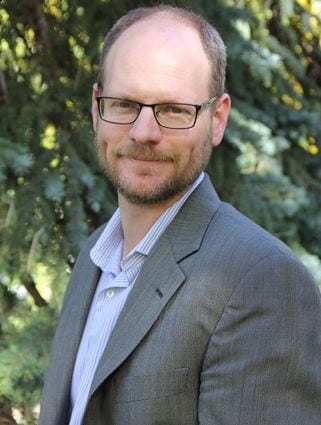Keynote Speaker
Pieter Dorrestein, University of California – San Diego
Pieter Dorrestein is Professor at the University of California – San Diego. He is the Director of the Collaborative Mass Spectrometry Innovation Center and a Co-Director, Institute for Metabolomics Medicine in the Skaggs School of Pharmacy & Pharmaceutical Sciences, and Departments of Pharmacology and Pediatrics. Since his arrival to UCSD in 2006, Prof. Dorrestein has been pioneering the development of mass spectrometry methods to study the chemical ecological crosstalk between populations of microorganisms, including host interactions for agricultural, diagnostic and therapeutic applications. He participated in panels for the white house science and technology office of president on the launch of a national microbiome initiative and has been on panels for the National Academy of Sciences on the Chemistry of the Microbiome. He has co-authored over 220 publications and his work has been featured by the wall street journal, CNN, NYTimes, Fox, BBC and hundreds of other news outlets. He has been recognized with several awards, among them are awards from the Beckman foundation, V-foundation in cancer research, EUREKA award for unconventional and enabling research, Hearst Foundation, Pharmaceutical Research and Manufacturing Association research award and the Abel award in pharmacology. For a more detailed biography see http://www.nature.com/news/the-man-who-can- map-the-chemicals-all-over-your-body-1.20035
Invited Speakers
Nathalie Agar, Harvard Medical School, Brigham and Women’s Hospital
 Nathalie Y. R. Agar, Ph.D. is an Associate Professor of Neurosurgery and of Radiology at Harvard Medical School, and the Daniel E. Ponton Distinguished Chair of Neurosurgery in the Department of Neurosurgery at Brigham and Women’s Hospital. Dr. Agar’s multidisciplinary training includes a B.Sc. in Biochemistry, Ph.D. in Chemistry, a postdoctoral fellowship in Neurology and Neurosurgery from McGill University, and further postdoctoral training in Neurosurgery at the Brigham and Women’s Hospital. From this unique background, she has developed distinct skills to better understand the requirements and limitations regarding the implementation of novel instrumentation, sample and data analysis, and cancer and surgical needs in the medical environment. She has also developed a network of specialists to satisfy the many different aspects of translational research activities.Her research aims to develop and implement comprehensive molecular diagnoses through improved biochemical classifications. This will ultimately enable surgeons and oncologists to tailor treatment from the time of surgery, and allow personalized cancer care using molecular imaging with mass spectrometry approaches. She is developing and validating a direct in vivo mass spectrometry analysis of surgical tissue to assist in the evaluation of tumor margins. Her laboratory also focuses on the mass spectrometry imaging of drugs and metabolites from pre-clinical animal models to clinical trials’ samples to study and screen for targeted therapeutics for brain cancers considering their ability to access the central nervous system.
Nathalie Y. R. Agar, Ph.D. is an Associate Professor of Neurosurgery and of Radiology at Harvard Medical School, and the Daniel E. Ponton Distinguished Chair of Neurosurgery in the Department of Neurosurgery at Brigham and Women’s Hospital. Dr. Agar’s multidisciplinary training includes a B.Sc. in Biochemistry, Ph.D. in Chemistry, a postdoctoral fellowship in Neurology and Neurosurgery from McGill University, and further postdoctoral training in Neurosurgery at the Brigham and Women’s Hospital. From this unique background, she has developed distinct skills to better understand the requirements and limitations regarding the implementation of novel instrumentation, sample and data analysis, and cancer and surgical needs in the medical environment. She has also developed a network of specialists to satisfy the many different aspects of translational research activities.Her research aims to develop and implement comprehensive molecular diagnoses through improved biochemical classifications. This will ultimately enable surgeons and oncologists to tailor treatment from the time of surgery, and allow personalized cancer care using molecular imaging with mass spectrometry approaches. She is developing and validating a direct in vivo mass spectrometry analysis of surgical tissue to assist in the evaluation of tumor margins. Her laboratory also focuses on the mass spectrometry imaging of drugs and metabolites from pre-clinical animal models to clinical trials’ samples to study and screen for targeted therapeutics for brain cancers considering their ability to access the central nervous system.
Ian Lewis, University of Calgary

Dr. Ian Lewis is an Assistant Professor and Alberta Innovates Translational Health Chair in the Department of Biological Sciences at the University of Calgary. Dr. Lewis earned a PhD in Biochemistry from the University of Wisconsin-Madison and completed his postdoctoral training at Princeton University. The Lewis laboratory specializes in unraveling the complex host-pathogen metabolic dynamics that occur during infections. To support this research, Dr. Lewis founded the Calgary Metabolomics Research Facility (CMRF), a unique microbiology, engineering, and analytical laboratory that was specifically designed for decoding microbial metabolism and translating these phenomena into practical tools for diagnosing and fighting infections. Dr. Lewis has recently launched the Alberta Precision Exchange https://albertaprecisionexchange.ca, an network of partners working with the Alberta Healthcare system to advance a suite of new diagnostic tools and treatment practices that may significantly reduce the number of people die from infections.
Susan Sumner, University of North Carolina
 Susan Sumner, PhD, is a Professor in the Department of Nutrition at the University of North Carolina at Chapel Hill (UNC-CH), where she is working to make Precision Nutrition a reality. The Sumner Lab at UNC Chapel Hill has served as the Eastern Regional Comprehensive Metabolomics Research Center (ERCMRC) since 2012, as an Untargeted Core for a NIEHS funded Children’s Health Exposure Analysis Resource (CHEAR) Hub (PI, Tim Fennell) since 2015, and as the Untargeted Core for the NIDDK funded Nutrition Obesity Resource Core (NORC, Zeisel, PI) since 2017. Dr. Sumner earned a PhD in physical chemistry at North Carolina State University, and conducted a postdoctoral fellowship in the Heart, Lung, and Blood Institute at the National Institutes of Health. She serves on the Editorial Boards for Frontiers in Nutrition, Metabolomics, Metabolites, Environmental Health Perspectives, and was elected two terms to the Board of Directors of the Metabolomics Society.
Susan Sumner, PhD, is a Professor in the Department of Nutrition at the University of North Carolina at Chapel Hill (UNC-CH), where she is working to make Precision Nutrition a reality. The Sumner Lab at UNC Chapel Hill has served as the Eastern Regional Comprehensive Metabolomics Research Center (ERCMRC) since 2012, as an Untargeted Core for a NIEHS funded Children’s Health Exposure Analysis Resource (CHEAR) Hub (PI, Tim Fennell) since 2015, and as the Untargeted Core for the NIDDK funded Nutrition Obesity Resource Core (NORC, Zeisel, PI) since 2017. Dr. Sumner earned a PhD in physical chemistry at North Carolina State University, and conducted a postdoctoral fellowship in the Heart, Lung, and Blood Institute at the National Institutes of Health. She serves on the Editorial Boards for Frontiers in Nutrition, Metabolomics, Metabolites, Environmental Health Perspectives, and was elected two terms to the Board of Directors of the Metabolomics Society.
Lunch and Learn Speakers
Julie St-Pierre, University of Ottawa – Sponsored by Agilent
The central research focus of the St-Pierre laboratory is the understanding of metabolic adaptation to physiological and pathological conditions. They are particularly interested in the plasticity of mitochondrial functions and how they contribute to overall energy homeostasis. During the last decade, her team contributed significantly to understanding the role of the master regulators PGC-1s in cancer, with a particular focus on poor outcome breast cancers. We showed that PGC-1alpha plays a key role in setting the metabolic state of poor outcome breast cancers and that it promotes breast cancer growth. Recently, we focused our investigation of the role of PGC-1s in breast cancer progression and we are pursuing research projects on metabolic adaptations fueling metastasis and therapeutic resistance. The St-Pierre laboratory is enriched by numerous national/international collaborations that complement our own expertise in metabolism. Dr. St-Pierre received her PhD at Cambridge University and was Postdoctoral Fellow at Cambridge University, Harvard Medical School, and University of Montreal, and was previously Assistant and Associate Professor at McGill University.
Anthony Midey, Waters – Sponsored by Waters
Anthony Midey is a Senior Application Support Scientist in the Biomedical Research group at Waters working in lipidomics, metabolomics, and Mass Spectrometry Imaging. He also supports direct sample analysis using techniques such as Desorption Electrospray Ionization (DESI) and Rapid Evaporative Ionization MS (REIMS). He has been supporting Waters applications for 4 years, with an extensive background in instrumentation and ion mobility spectrometry from 10 years in the instrument industry, with 55 publications in peer-reviewed journals and numerous conference presentations.
Baljit Ubhi, Quantitative Metabolomics, SCIEX – Sponsored by SCIEX
Baljit is currently responsible for the global metabolomics & lipidomics business at SCIEX and is based on the West Coast in California, USA. Baljit joined SCIEX in Europe in November 2011 after finishing her Ph.D. studies at the University of Cambridge, where she applied metabolomics & lipidomics to disease biomarker research in the group of Dr Julian Griffin. Prior to this, she held a research scientist position in the metabolic profiling group at GlaxoSmithKline R&D in the UK where she evaluated biomarkers for the effects of drug toxicity in support of drug candidate selection and development. In her time at SCIEX Baljit has been significantly involved in a new product development working closely with the marketing, product management, R&D and applications teams as well as many other responsibilities.
Ieva Roznere, The Ohio State University — Sponsored by Metabolon
Ieva Roznere, PhD, is a research associate in the department of Evolution, Ecology, and Organismal Biology at The Ohio State University. She is an aquatic ecologist interested in how environmental stress affects freshwater mussel physiology. Dr. Roznere’s research focuses on how metabolism and gene expression change when freshwater mussels are subjected to stressors such as translocation to different habitats, food limitation, and exposure to contaminants. She collaborates with U.S. Fish and Wildlife Service, Ohio Division of Natural Resources, Metro Parks, and The Columbus Zoo and Aquarium. She received her B.S. from Binghamton University and her Ph.D. from The Ohio State University.
